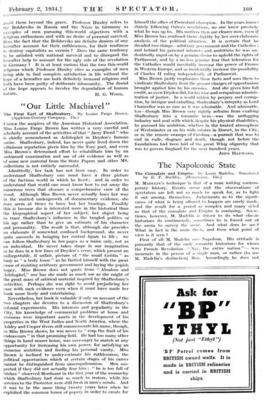"Our Little Machiavel"
The First Earl of Shaftesbury. By Louise Fargo Brown. (Appleton-Century Company. 15s.) UNDER the auspices of the American Historical Association, Miss Louise Fargo Brown has written a very careful and scholarly account of the activities of that " faery Fiend" who is chiefly remembered as Achitophel in Dryden's famous satire. Shaftesbury, indeed, has never quite lived down the villainous reputation given him by the Tory poet, and even Miss Brown's determined effort to rehabilitate him by an unbiassed examination and use of old evidence as well as of some new material from the State Papers and other MS. collections is not entirely successful.
Admittedly, her task has not been easy. In order to understand Shaftesbury one must have a clear picture of the factious world in which he lived ; and in order to understand that world one must know how to cut away the numerous trees that obscure a comprehensive view of the wood. Although Miss Brown never actually loses her way in the matted undergrowth of documentary evidence, she does seem at times to have lost her bearings. Possibly this is because she is interested more in the historical than the biographical aspect of her subject, her object being to trace Shaftesbury's influence in the tangled politics of his age rather than to give an estimate of his character and personality. The result is that, although she provides an elaborate if somewhat confused background, she never quite succeeds in bringing her central figure to life ; we can follow Shaftesbury in her pages as a name only, not as an individual. He never takes shape in our imagination as he does in a few lines of Dryden's verse, which present an unforgettable, if unfair, picture of "the small Goblin" as busy as "a body louse" as he fretted himself with the great cause of resisting arbitrary government and laying the popish bogey. Miss Brown does not quote from "Absalom and Aehitophel," nor has she made as much use as she might of the great mass of satirical material inspired by Shaftesbury's activities. Perhaps she was right to avoid prejudicing her case with such evidence even when it must hive made her book more lively and entertaining.
Nevertheless, her book is valuable if only on account of the two chapters she devotes to a discussion of Shaftesbury's colonial experiments. His interests and popularity in the City, his knowledge of commercial problems at home and overseas were important assets in the development of his properties in the West Indies and North America, where the Ashley and Cooper rivers still commemorate his name, though, as Miss Brown shows, he was never to "reap the fruit of his endeavours" in that promising field. He had too many other things in hand nearer home; was over-eager to snatch at any opportunity for increasing his own power, for satisfying an immense ambition and feeding his personal vanity. Miss Brown is inclined to under-estimate his ruthlessness, the political opportunism which at certain stages of his career cannot be distinguished from unscrupulousness. Men sus- pected if they did not actually fear him : "he is too full of trickes " observed Mordaunt in the first year of the monarchy which Shaftesbury had done so much to restore, while his services to the Protector were still fresh in men's minds. And it was to be the same thing twenty years later when he exploited the common terror of popery in order to create for
himself the office of Protestant champion. In the years Mime: diately following Oates's revelations, no one knew precisely what he Was up to. His motives then are clearer now, even if Miss Brown has confused them slightly by her over-elaborate analysis of the political situation. It is certain that he dreaded two things—arbitrary government and the Catholics ; and behind his personal interests and ambitions he was un- doubtedly urged on by a genuine desire to uphold the rights of - Parliament, and by a no less genuine fear that toleration for the Catholics would inevitably increase the power of France in Western Europe, and so incidentally increase the possibility of Charles II ruling independently of Parliament.
Miss Brown justly emphasizes these facts and uses them to vindicate Shaftesbury from the grosser charges of opportunism brought against him by his enemies. And she gives him full credit, as even Dryden did, for his wise and scrupulous adminis- tration of justice. In a world ridden by perjury and comp- tion, by intrigue and caballing, Shaftesbury's integrity as Lord Chancellor was as rare as it was admirable. And admirable, too—though Miss Brown very rightly refrains from exalting Shaftesbury into a romantic hero—was the unflagging industry and zeal with which, despite his physical disabilities, he pursued his ambition, whether in the heated atmosphere of Westminster or on his wide estates in Dorset, in the City, or in the remote swamps of Carolina—a pursuit that was to end in exile, disgrace and death, though not before the foundations had been laid of the great Whig oligarchy that was to govern England for the next hundred years.
JOHN HAYWARD.








































 Previous page
Previous page